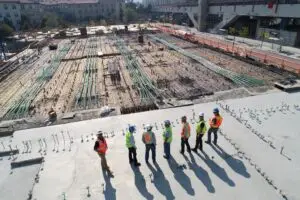 Construction is one of the most dangerous fields worldwide. Injuries, disabilities and fatalities are common. Often, these result from negligent employers and a failure to create a culture that prioritizes safety. Still, there are instances where workers’ actions resulted in their injuries or even their deaths. When this happens, are the workers still entitled to workers’ compensation? Will they need to fund their recovery on their own?
Construction is one of the most dangerous fields worldwide. Injuries, disabilities and fatalities are common. Often, these result from negligent employers and a failure to create a culture that prioritizes safety. Still, there are instances where workers’ actions resulted in their injuries or even their deaths. When this happens, are the workers still entitled to workers’ compensation? Will they need to fund their recovery on their own?
Can You Get Workers’ Compensation If You Caused the Accident?
Workers’ compensation works on a no-fault basis. This means that, in general, it doesn’t matter who caused the accident. You may be eligible for workers’ compensation benefits if you sustain injuries on the job.
The one exception to this rule is if your injury was deliberately self-inflicted. If you engaged in intentional self-harm, especially while under the influence of drugs or alcohol, you may not receive workers’ compensation. Workers’ compensation works differently across states, but the general qualifications and provisions are quite similar.
Temporary Total Incapacity Benefits
In Massachusetts, workers qualify for total incapacity workers’ compensation if their injuries prevent them from working for six or more calendar days, whether total or partial. This remains true even if the six days are not consecutive.
Temporary Partial Incapacity Benefits
Workers qualify for temporary partial incapacity workers’ comp benefits if they sustained injuries that have caused them to earn less. Reasons for making less money could range from working fewer hours to taking a lower-paying position.
Permanent and Total Incapacity Benefits
Workers qualify for permanent and total incapacity benefits when they cannot work because of their injuries. Massachusetts also allows workers to apply for permanent benefits before exhausting their temporary benefits.
Scarring, Disfigurement and Permanent Loss of Function
As the name suggests, workers may qualify for this benefit if a work-related accident led to disfigurement, scarring or permanent disability. They receive this benefit in addition to other existing options, such as medical benefits and compensation for lost wages.
How Much Can You Get for Workers’ Compensation?
Because this program works on a no-fault basis, there is no comparative negligence. That means you don’t lose a portion of the benefits based on how much blame for the accident goes to you.
Temporary Total Incapacity Benefits
Workers may receive 60% of their gross wages. These wages depend on the average earned over the 52 weeks leading up to the time of injury. Massachusetts does set a cap on compensation at wherever the State Average Weekly Wages stood at the time of the accident. You may receive these benefits for up to 156 weeks.
Temporary Partial Incapacity Benefits
Workers may receive up to 75% of weekly temporary benefits. These benefits are 60% of the average gross weekly wage before the accident. For example, if you would have received $500 as a total temporary benefit, the partial benefit would amount to $375 (500×0.75).
Permanent and Total Incapacity Benefits
You may receive 66% of the average gross weekly wage you earned before the accident. The state caps the amount you can receive at its SAWW. Interestingly, it also sets a minimum collection at 20% of that figure. People who receive this benefit may also get an annual adjustment based on the cost of living. They may continue to receive this benefit for as long as they remain disabled.
Scarring, Disfigurement and Permanent Loss of Function
Workers who qualify for this benefit receive one lump sum payment. The amount they receive depends on the severity of the injury.
What About Medical Benefits After a Construction Injury?
The medical benefits portion of workers’ compensation also operates on a no-fault basis. Workers qualify so long as they suffer a work-related injury. The benefits continue for as long as the injury or illness remains. However, the insurance company funding the medical procedures may stop doing so if it believes it is no longer necessary. Workers can appeal these cases.
Here are some of the benefits workers may receive:
- Reimbursement for miles traveled related to securing medical attention
- Payment for reasonable and adequate medical care
- Reimbursement for prescription medication
- Payment for the first visit to the doctor
In Massachusetts, the employer or insurance company may have the right to send workers to a medical doctor for the first visit. After that, the worker may choose another healthcare provider. The insurer may also have the right to require regular visits to its own healthcare provider for evaluation purposes.
What About Personal Injury Benefits After a Construction Accident?
Even if you work at the construction company, you might not have been working when you sustained your injuries. Maybe you didn’t work at the construction site but suffered injuries anyway. In these cases, injured persons may pursue personal injury or premises liability claims to receive medical benefits and other forms of compensation.
However, personal injury law operates on a fault basis. If you are solely to blame for the accident, you likely do not have a claim. When multiple factors lead to the accident, a lawsuit might become possible due to comparative negligence. Massachusetts requires that 51% of the blame go to someone else but the injured person for that person to have a claim.
For example, let’s say you were trespassing in an abandoned building to get night-time photographs. Unbeknownst to you, new owners have decided to renovate the property. Because it is remote and abandoned, the workers never put up signs warning about construction or the hazards on the site. While exploring the property, you step on a poorly covered hole. The wood snaps and you fall in and break your legs.
The insurance company and construction company will likely argue that you should have never entered the area. An experienced attorney might say that while that is true, the company failed to erect signs that would have warned of the possible danger and made it easier for you to make an informed decision about whether to proceed.
What Should You Look for in a Good Construction Injury Lawyer?
You won’t need to look very hard to find attorneys eager to take on your construction injury case. Making the right choice can significantly improve your chances of success. Here are some of the factors you should look out for:
- The lawyer should have experience with construction injury cases.
- The lawyer should be familiar with the relevant laws and regulations, including OSHA standards.
- The lawyer should be comfortable taking your case to trial if necessary.
- The lawyer should be able to communicate effectively and regularly update you on the status of your case.
- The lawyer should have a good reputation among his or her peers and in the legal community.
- The lawyer should treat you and your family with compassion.
How Can an Experienced Attorney Help You With a Construction Injury Case?
Construction accident cases often involve multiple factors that can be difficult to navigate without experienced legal help. From the initial investigation and gathering of evidence to dealing with the insurance companies, an attorney can help you every step of the way.
An attorney also knows how to value your claim and ensure you receive the maximum compensation you deserve. This includes medical benefits and lost wages and long-term disability when necessary.
At Jason Stone Injury Lawyers, we fight hard for our clients to get the compensation they need to recover from their injuries and reclaim their lives. Contact us for more information.
Not Trusting What You’re Being Told?
Better Phone Stone
800-577-5188
 START MY NO OBLIGATION CONSULTATION
START MY NO OBLIGATION CONSULTATION











